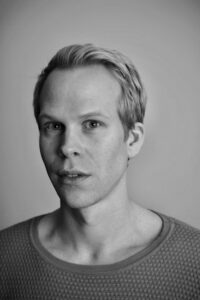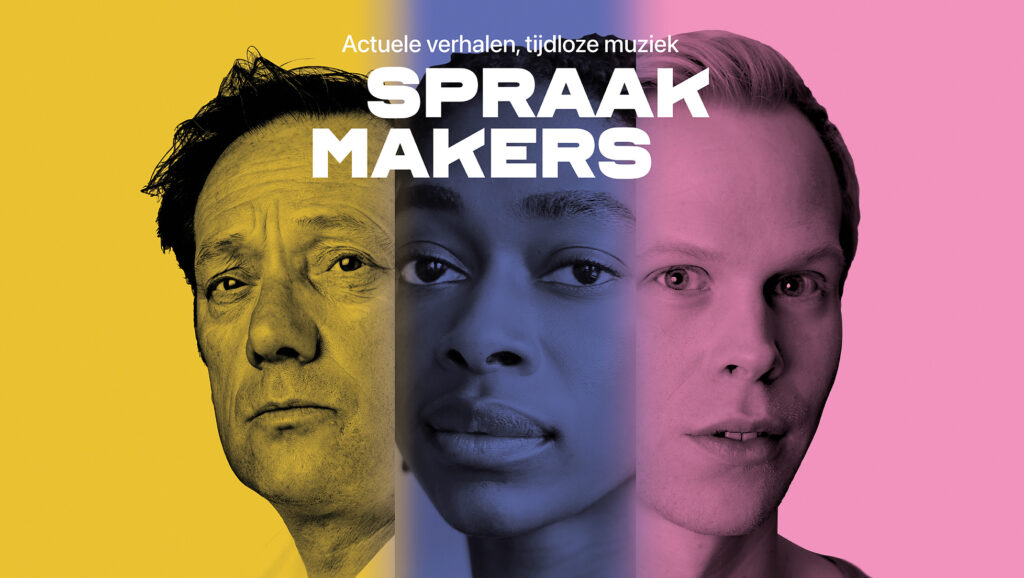In classical music, everything is about the composition. The composer's sexuality, for example, is irrelevant. But the makers of the concert series Spokespeople think otherwise. Top actors Gijs Scholten van Aschat, 'Ntianu Stuger and Rick Paul van Mulligen combine topical stories with memorable compositions from classical music. For instance, Van Mulligen discusses Samuel Barber's String quartet the topic of sexual diversity.
Text: Annika Hoogeveen Photo: Mirte Slaats
Rick Paul van Mulligen: Spokespeople consists of three different sections. My section is Queer Classic. I spoke for a very long time with Rick Steggerda (one of the story writers, ed.) On what queer means to me. How it feels for me to listen to a queer composer. And does it add value if I know the person was gay? Based on these conversations, Rick wrote a story for at String quartet (performed by the Matangi Quartet, ed.), a piece of music by American composer Samuel Barber.
Does a composer's sexual background influence how you listen to should music?
Yes. When I am aware of it, I listen to it differently. Then my focus is on recognition. During the performance, I discuss this in the hope that the audience hears it too. Of course, it is quite interpretable, what one hears or feels with music, so I found that an interesting entry point.

Can current stories be combined with music from a distant past?
Classic music has no lyrics that distract, it allows you to listen to it with concentration; make an analysis of the emotions it evokes. Music can pull you into the present day because it is one of the art forms that touches you the quickest. Therefore, it is easy to combine with current texts. Under a dramatic piece with lots of horns that sounds harsh and aggressive, you can put a modern angry account.
How did you become part of Spokespeople and why did you want to be a part of it?
I was approached after they saw me play in Queer Planet from the National Theatre. To complement the performance, the makers wanted someone to tackle the queer theme. I thought it would be interesting to do, especially because classical music is sometimes an unwieldy institution. Of many composers, you don't know if they were gay. The sexuality often doesn't matter because it's about the music and not the composer. That's why I thought it was a fascinating concept to take another look at that now. To investigate whether their sexual background might be the reason why the music turned out the way it did.
What about your participation in Queer Classic?
The composer and music pieces had already been chosen. But it is my story. Based on my feelings and experiences. I said where the recognition was for me and what I felt about it; one piece made me relive the loneliness of the past. During Barbers String quartet there are all kinds of moments where I discuss the music and what I want to connect to it in terms of my own story.
Did you know Samuel Barber before Spokespeople?
No. That goes for classical music anyway: I like a lot and I don't know anything. (laughs) I have no idea who made what. But it was fun to delve into Barber's life and music.
Have you gained more appreciation for him?
Yes, I feel personally connected to the pieces of music now. Of course, this is also because I have given it my own interpretation. I feel like I got to know the man somewhat.
How do you think Barber would experience the present day?
Anyway, making his orientation known quicker. That's the big difference between then and now, on the one hand, and not on the other. As a queer, you reside in a world and society where most people are not like you. No matter how sweet and accepting they are, in essence you are an outsider. This results in a sense of loneliness and Barber would still experience that today. I also hear that in his work and I think that feeling would still be reflected in his music today.
Sounds sad.
Also connecting. For the people who recognise themselves in that, because there are a lot of them. That is one of the reasons why I find it so special to Spokespeople to do. The first time we did the show, there were a lot of queer people and there is connection in that. Of course, there were also many visitors who were not queer, but still recognised that lonely me-against-the-rest feeling. In essence, everyone feels different.
The tormented artist makes the most beautiful art; would musical pieces be as impressive if those artists' lives had gone more smoothly?
I don't believe that if everyone was happy, beautiful art would no longer be made. I myself am reasonably happy and doing quite well. (laughs) However, I do understand that it can be seen or heard when someone is poked and prodded through life. It adds several layers. However, you don't wish it on anyone. Besides, I think people are so talented that they don't need tragedies to create something special.
Speechmakers can be seen in various Dutch theatres from 25 January to 4 February 2024. For more information: www.spraakmakers.net



